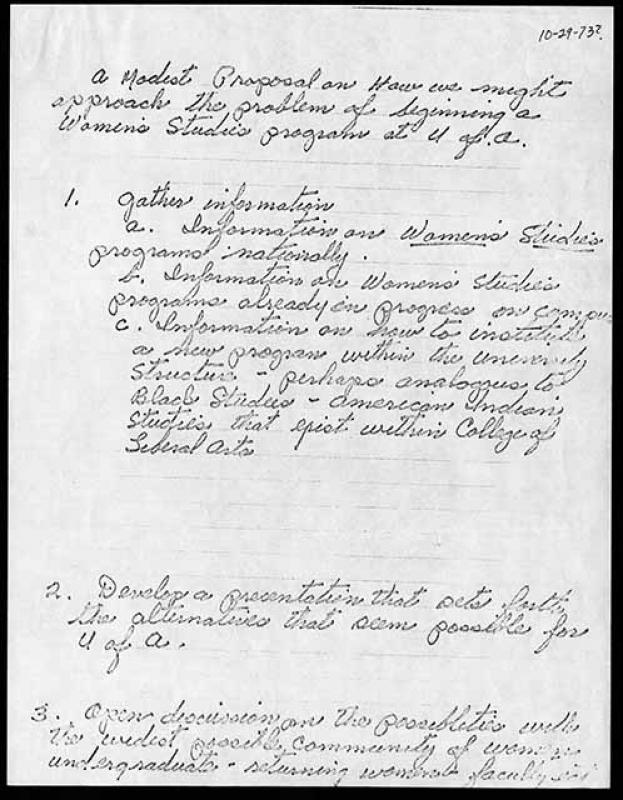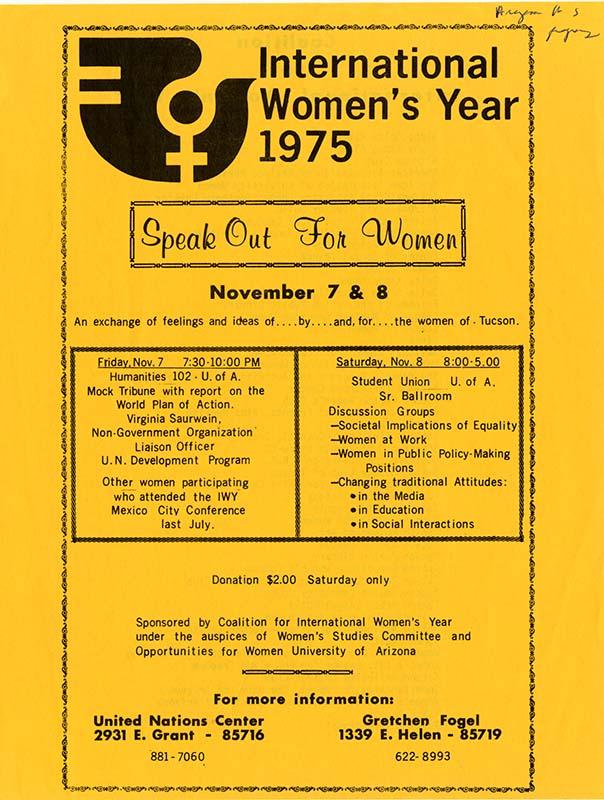Women's Studies at the University of Arizona
“Who knows what women can be when they are finally free to become themselves?”
Betty Friedan[i]
The 1960s marked the resurgence of the women’s movement focused on social and cultural changes that challenged patriarchy. Feminists sought an expanded public role for women, entry into non-traditional occupations, employment rights, reproductive rights, changes to home and family roles, and access to higher education. Women were eager to read feminist thinkers, like Betty Friedan, Simone de Beauvoir, and Margaret Mead, and reflect on how these ideas connected with their own lives. In 1972, Gloria Steinem founded Ms. magazine, the world’s first feminist magazine designed for mass circulation. In 1970, the Boston Women’s Health Collective published a booklet Women and their Bodies that sold for 75 cents. It quickly became the bestselling book Our Bodies, Ourselves. Florence Howe, called the Elizabeth Cady Stanton of women’s studies by her colleagues, founded The Feminist Press in 1970 to reprint feminist classics and support the emerging field of women’s studies at a time when many larger publishers were uninterested in women authors.[ii]
Colleges and universities were at the center of this exciting, new phase of the women’s movement. In the 1970s women faculty and students began meeting informally to discuss their lives and strategize about social change. Women faculty started teaching courses on campuses across the country that focused on work by and about women. They sought to increase the awareness of women’s issues and rights and to augment women’s voices.
At the University of Arizona, a small group of faculty women started meeting informally in 1970 to discuss concerns about their rights and treatment on campus. Several of these women had brought a lawsuit against University of Arizona President Harvill and the Arizona Board of Regents, successfully challenging a 22-year-old nepotism rule at the university. Nepotism rules forbid the hiring of family members, including spouses of faculty members, out of concern that family members would be treated more favorably than non-family members. In a small city like Tucson, this practice resulted in many women not able to find jobs because they were spouses of faculty members.
These women called themselves “the group.” In 1972, they decided to organize more formally. They wrote to University of Arizona President Schaefer and asked for recognition of a new campus organization, the Committee on the Status of University Women (CSUW). The name Faculty Women had previously been taken by the Faculty Women’s Club, a social organization primarily for the wives of faculty members, although women faculty were also invited to join. This new organization was open to faculty, staff, and graduate and undergraduate students. The women wrote a constitution. “The first officers were elected, a somewhat difficult task since few women faculty were tenured and all felt some apprehension about the effect that being identified with a women’s group might have on their professional careers.”[iii] Professor Laurel Wilkening (Lunar and Planetary Science), Lynn Harris (staff member), and Jean Parker (student) were the co-chairs.
CSUW set two goals. First, they began an effort to monitor the status of women faculty by asking for the numbers of faculty in each department by rank and gender. The information was too inaccurate to be useful, but CSUW kept asking and the university started collecting information that included sex. The officers also sent a letter to President Schaefer about their concerns that tightening promotion and tenure guidelines would negatively impact the already small number of women faculty.

Women's Studies program proposal circa 10-29-1973, AWF records (MS 334) UA Libraries, Special Collections
A second goal was to explore beginning a women’s studies program. San Diego State University established the first women’s studies program in 1970. CSUW appointed a taskforce to investigate campus interest in starting a women’s studies program. The Taskforce on Women’s Studies submitted “A modest proposal on how we might approach the problem of beginning a Women’s Studies program at U of A” to CSUW in October 1973.[iv] Taskforce members gathered information about national models, solicited interest from women faculty, and met with administrators and department heads on campus to assess support for the proposal. A year later, CSUW reported that Dean Paul Rosenblatt (College of Liberal Arts) sanctioned the development of a new program in Women’s Studies and suggested that the new interdisciplinary program in Chicano Studies could be a model.[v]
By 1974 faculty offered four women’s studies courses in the departments of English, Sociology, Nursing, and Home Economics. Dr. Myra Dinnerstein was hired in 1975 as chair of the Women’s Studies committee with two work study students to provide staff support. A modest beginning indeed!
During this same time period, women at the university wanted to draw attention to women’s voices so they organized efforts to bring feminist speakers to campus and to hold events where women could speak out about their own rights and issues. These events involved partnerships with the community to bring these feminist ideas to the broadest, most diverse audiences.
For example, in November 1975 students and faculty organized a Speak Out for Women rally as part of International Women’s Year.[vi] They also organized a conference Women at the Frontier—Equality Then and Now that provided an opportunity to learn about women’s history and the current gender inequalities.[vii]
Nationally known feminist speakers also brought attention to women’s issues. In November 1975 Gloria Steinem visited campus and gave two addresses “The Future of Feminism” and “The Feminist Revolution.”[viii] Her visit was co-sponsored by the Committee on Women’s Studies, Women’s Drop-in Center, and the Employee Rights Association of Pima Community College. Sarah Weddington, Special Assistant to President Jimmy Carter, visited campus in 1979 and discussed how diplomacy can be used to fight for women’s rights.[ix] Weddington had gained a national reputation as the lawyer who won the 1973 Roe v Wade case on reproductive rights in the Supreme Court
__________________________________________________________________

